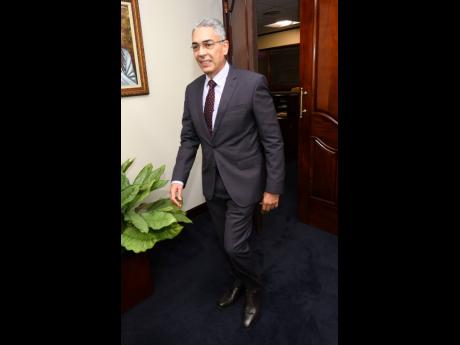Growth & Jobs | BOJ warns inflation could derail growth prospects
THE BANK of Jamaica (BOJ) says high inflation could dampen domestic consumption and derail its projection for economic growth of between 2.5 per cent and 4.5 per cent for the 2022-23 fiscal year.
Speaking during the BOJ’s quarterly media briefing on Friday, August 19, Governor Richard Byles said “there is a risk that domestic consumption could be adversely affected by the high, albeit falling, domestic inflation”.
Having peaked at 11.8 per cent in April, annual point-to-point inflation slowed to 10.9 per cent in both May and June, and 10.2 per cent in July. Declining international commodity prices, relative stability in the exchange rate, tighter liquidity management by BOJ and higher interest rates were credited by the central bank as the reasons for the slowdown.
The BOJ expects annual inflation to trend towards nine per cent for the remainder of 2022, and decline further in early 2023, before settling within the targeted four to six per cent range by December 2023. However, this is as long as tensions between Russia and Ukraine do not escalate, and inflation among Jamaica’s trading partners continue to fall.
Additionally, he said: “Growth in tourist arrivals and related activities could be lower than projected, given strong headwinds to global growth from inflation, tighter financial conditions and geopolitical tensions. More severe weather in the context of climate change also poses a downside risk to GDP growth.”
Noting that the economy continues to perform creditably, the central bank head cited signs of strong economic expansion in the April to June 2022 quarter, “and, so far, in the September 2022 quarter”.
“There has also been some buoyancy in the agricultural sector, which is expected to continue as the tourism sector recovers and weather conditions remain favourable. The forecasted growth also reflects the recent resumption of production at the JAMALCO alumina plant,” he added.
The JAMALCO plant, which is based in Clarendon, was impacted by a major fire in August 2021.
He said the labour market continues to perform exceptionally, noting that the April 2022 Labour Force Survey out-turns showed that the unemployment rate fell to a historic low of six per cent.
Despite the economic downturn globally and locally, Byles told journalists that the financial system remains resilient, pointing out that deposit-taking institutions’ (DTIs’) balance sheets have remained “adequately capitalised and in compliance with prudent liquidity standards”.
“The quality of the DTIs’ loan portfolio remained stable, with a ratio of non-performing loans to gross loans marginally better than that recorded a year earlier,” he added.
Byles did point out, however, that private-sector credit provided by DTIs has slowed, reflecting the lagged effect of the pandemic and the impact of higher interest rates on credit demand, particularly from businesses.
He is projecting lower growth for the 2023-24 fiscal year at between one and three per cent.



